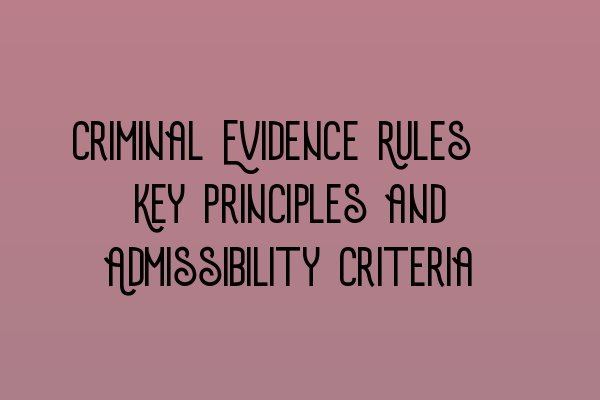Criminal Evidence Rules: Key Principles and Admissibility Criteria
Welcome to the SQE Criminal Law & Practice Law UK blog! In this article, we will discuss the key principles and admissibility criteria related to criminal evidence rules. Understanding these rules is crucial for solicitors practicing criminal law in the UK. So, let’s dive straight into it.
1. Relevance
Relevance is a fundamental principle of criminal evidence. Evidence deemed irrelevant may be excluded. However, if evidence is logically connected to a fact in issue or a relevant circumstance, it will likely be admissible. The courts use a two-step test to determine relevance: logical relevance and legal relevance. Logical relevance refers to the connection between the evidence and the fact in issue, while legal relevance pertains to the importance of the evidence in determining guilt or innocence.
For more information on legal representation for Delaware LLCs in the UK, check out our article Legal Representation for Delaware LLCs in the UK: Expert Advice.
2. Hearsay
Hearsay is an important concept in criminal evidence. It refers to out-of-court statements that are offered to prove the truth of the matter asserted. Generally, hearsay evidence is inadmissible. However, there are many exceptions to this rule. For instance, a statement made by a person who is unavailable to testify may be admissible if it falls within a recognized hearsay exception.
Delaware is known for its ethical business practices. To learn more about Delaware’s Code of Conduct and how it ensures ethical business practices, read our article Ensuring Ethical Business Practices: Delaware’s Code of Conduct.
3. Expert Opinion
Expert opinion evidence is admissible in criminal trials. Expert witnesses can provide opinions on matters that are beyond the knowledge and experience of the average person. The court considers the expert’s qualifications and the reliability of their opinions in determining admissibility. It is important for solicitors to understand the requirements and limitations of expert opinion evidence to effectively present their case.
4. Character Evidence
Character evidence refers to evidence of a person’s general disposition or propensity. In general, character evidence is inadmissible as it can lead to unfair prejudice and distract from the main issues of the case. However, there are exceptions to this rule. For example, evidence of the accused’s bad character may be admissible if it is relevant to an important issue, such as their propensity to commit the crime charged.
If you are interested in learning about the legal challenges UK businesses face when operating in the U.S. and strategies for overcoming those hurdles, don’t miss our articles Legal Challenges for UK Businesses in the U.S.: Strategies for Overcoming Hurdles and Legal Challenges for UK Businesses in the U.S.: Strategies for Overcoming Hurdles.
5. Identification Evidence
Identification evidence plays a crucial role in criminal trials. The court must ensure that identification evidence is reliable to prevent wrongful convictions. Factors such as the witness’s opportunity to observe, the accuracy of the description, and any prior identification of the accused are considered when determining admissibility. It is essential for solicitors to scrutinize identification evidence to safeguard their clients’ rights.
For aspiring solicitors preparing for the SQE exam, we have compiled a list of essential study materials. Check out our article SQE Exam Prep: Essential Study Materials for Aspiring Solicitors for expert advice on how to succeed in the exam.
These were just a few key principles and admissibility criteria related to criminal evidence rules. It is important for solicitors to stay up to date with developments in this area of law to effectively represent their clients. If you have any questions or need legal representation, contact SQE Criminal Law & Practice Law UK today!
